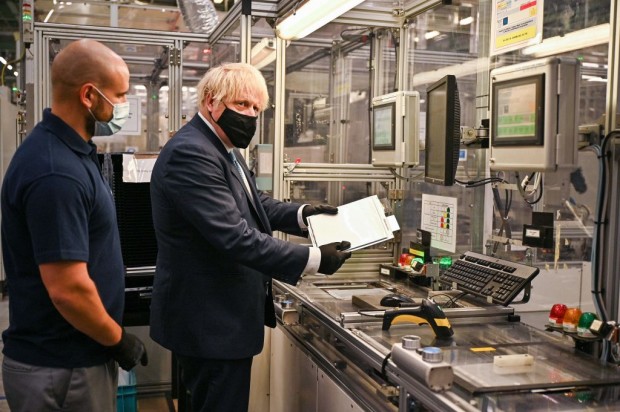British Prime Minister Boris Johnson visits the Envision battery manufacturing facility at the Nissan production plant in Sunderland, north east England on July 1, 2021.
(Photo : JEFF J MITCHELL/POOL/AFP via Getty Images)
Envision AESC's quest to become the world's biggest battery supplier got a major boost, with Nikkei Asia reporting that the Chinese company will soon begin mass-producing batteries capable of giving electric vehicles a driving range of at least 1,000 kilometers.
Envision AESC, which is currently the world's seventh biggest supplier of batteries in terms of shipping volume, allots 90 percent of its production today to Japanese auto giant Nissan. Envision AESC aims to broaden its reach, though, targeting other Chinese, Japanese and European carmakers to join its client list.
Having a battery that can provide a 1,000-kilometer driving range will surely attract the attention of other automakers. Envision AESC Group will double the number of battery cells in each vehicle to achieve that target number, making the cars heavier in the process. The upside of the vehicle gaining more weight than before will be its increased driving range.
Envision looks to expand production capacity soon
With demand for electric vehicles expected to go even higher in the coming years, the Chinese battery maker looks to benefit from it by increasing its production capacity to at least ten times the current level by the end of the 2020s. However, it is paramount for Envision AESC to expand its clientele with the company, hoping that customers from around the globe will make up around half of its total transactions by the year 2025.
At the moment, Envision AESC's finances are mainly boosted by its partnership with Nissan Motor. The company has long been a supplier of Nissan, with Envision AESC providing the battery for the Nissan Leaf. That battery helps Nissan's electric vehicle reach a driving range of around 450 kilometers now.
Envision AESC has implemented major changes with its new batteries, with the Chinese group saying that it will pack the cells closer together. Envision's new batteries also have an improved storage efficiency, which is great news for future customers. The technology advancement will help shorten the charging time of the battery by around 30 percent to just under 20 minutes.
Also Read: Lightning eMotors Completes Expansion of Colorado Facility: EV Maker to Double Production Capacity
Envision to build new facility in Japan for EV battery production
To help facilitate these ground-breaking changes, Envision will begin building a new facility in Ibaraki Prefecture near Tokyo that will start battery production in 2024. Envision's plant in Japan will include a production line for the aforementioned new batteries. The energy used during production will come from solar panels installed within the premises, helping the company slash its carbon dioxide emissions to zero as well.
There are other battery projects in the pipeline for Envision AESC as it looks to increase its market share in the industry. Envision is developing an all-solid-state battery, with a prototype of this product expected to arrive sometime in 2026. The Chinese group looks to become a leader in this battery segment, with the final product expected to launch in 2030.
Envision AESC is aiming high with that project, with the company looking to build new facilities not only in its home country of China but also in the UK, France, Japan, and the United States by the late 2020s.
R
elated Articles:
Volkswagen and Huawei Plan Joint Venture to Develop Autonomous Driving System
Volkswagen Planning Porsche IPO: Market Listing Could Place Car Brand's Value up to $102 Billion
See Now: OnePlus 6: How Different Will It Be From OnePlus 5?




























